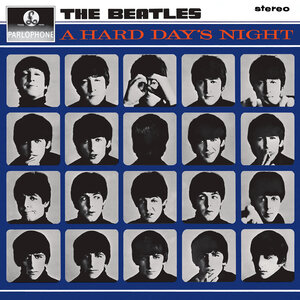
A Hard Day's Night is the third studio album by the English rock band the Beatles, released on 10 July 1964 by Parlophone, with side one containing songs from the soundtrack to their film of the same name. The American version of the album was released two weeks earlier, on 26 June 1964 by United Artists Records, with a different track listing that included selections from George Martin's film score. In contrast to the Beatles' first two albums, all 13 tracks on A Hard Day's Night were written by John Lennon and Paul McCartney, showcasing the development of their songwriting partnership.

The The are an English post-punk band. They have been active in various forms since 1979, with the singer-songwriter Matt Johnson as the only constant band member. The The achieved critical acclaim and commercial success in the UK, with 15 chart singles, and their most successful studio album, Infected (1986), spent 30 weeks on the chart. They followed this with the top-ten studio albums Mind Bomb (1989) and Dusk (1993).

"Lili Marleen" is a German love song that became popular during World War II throughout Europe and the Mediterranean among both Axis and Allied troops. Written in 1915 as a poem, the song was published in 1937 and was first recorded by Lale Andersen in 1939 as "Das Mädchen unter der Laterne". The song is also well known on a version performed by Marlene Dietrich.

"Unchained Melody" is a 1955 song with music by Alex North and lyrics by Hy Zaret. North wrote the music as a theme for the prison film Unchained (1955), hence the song title. Todd Duncan sang the vocals for the film soundtrack. It has since become a standard and one of the most recorded songs of the 20th century, most notably by the Righteous Brothers in 1965. According to the song's publishing administrator, over 1,500 recordings of "Unchained Melody" have been made by more than 670 artists, in multiple languages.

"That'll Be the Day" is a song written by Buddy Holly and Jerry Allison. It was first recorded by Buddy Holly and the Three Tunes in 1956 and was re-recorded in 1957 by Holly and his new band, the Crickets. The 1957 recording achieved widespread success. Holly's producer, Norman Petty, was credited as a co-writer, although he did not contribute to the composition.
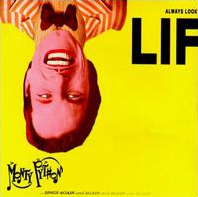
"Always Look on the Bright Side of Life" is a comedy song written by Monty Python member Eric Idle that was first featured in the Python film Life of Brian and has gone on to become a common singalong at public events such as football matches as well as funerals.

"Secret Love" is a song composed by Sammy Fain (music) and Paul Francis Webster (lyrics) for Calamity Jane, a 1953 musical film in which it was introduced by Doris Day in the title role. Ranked as a number 1 hit for Day on both the Billboard and Cash Box, the song also afforded Day a number 1 hit in the UK. "Secret Love" has subsequently been recorded by a wide range of artists, becoming a C&W hit firstly for Slim Whitman and later for Freddy Fender, with the song also becoming an R&B hit for Billy Stewart, whose version also reached the top 40 as did Freddy Fender's. In the UK, "Secret Love" would become the career record of Kathy Kirby via her 1963 remake of the song. The melody bears a slight resemblance to the opening theme of Schubert's A-major piano sonata, D.664.
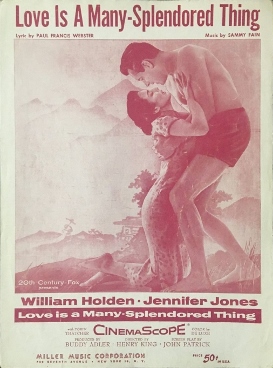
"Love Is a Many-Splendored Thing" is a popular song with music by Sammy Fain and lyrics by Paul Francis Webster. The song appeared first in the movie Love Is a Many-Splendored Thing (1955), and it won the Academy Award for Best Original Song in 1956. From 1967 to 1973, it was also used as the theme song to Love is a Many Splendored Thing, the soap opera based on the movie.
"Smile" is a song based on the theme song used in the soundtrack for Charlie Chaplin's 1936 film Modern Times.

"Que Sera, Sera " is a song written by the team of Jay Livingston and Ray Evans that was first published in 1955. Doris Day introduced it in the Alfred Hitchcock film The Man Who Knew Too Much (1956), singing it as a cue to their onscreen kidnapped son. The three verses of the song progress through the life of the narrator—from childhood, through young adulthood and falling in love, to parenthood—and each asks "What will I be?" or "What lies ahead?" The chorus repeats the answer: "What will be, will be."
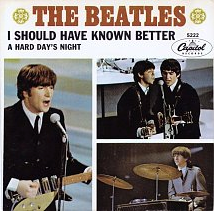
"I Should Have Known Better" is a song by English rock band the Beatles composed by John Lennon, and originally issued on A Hard Day's Night, their soundtrack for the film of the same name released on 10 July 1964. "I Should Have Known Better" was also issued as the B-side of the US single "A Hard Day's Night" released on 13 July. An orchestrated version of the song conducted by George Martin appears on the North American version of the album, A Hard Day's Night Original Motion Picture Soundtrack.
"Lullaby of Broadway" is a popular song with music written by Harry Warren and lyrics by Al Dubin, published in 1935. The lyrics salute the nightlife of Broadway and its denizens, who "don't sleep tight until the dawn."
"You'll Never Know", sometimes referred to as "You'll Never Know (Just How Much I Love You)" in later years, is a popular song with music written by Harry Warren and the lyrics by Mack Gordon. The song is based on a poem written by a young Oklahoma war bride named Dorothy Fern Norris.
"Police and Thieves" is a reggae song first recorded by the falsetto singer Junior Murvin in 1976. It was covered by the punk band The Clash and included on their self-titled debut album released in 1977.

Yellow Submarine is the tenth studio album by the English rock band the Beatles, released in January 1969. It is the soundtrack to the animated film of the same name, which premiered in London in July 1968. The album contains six songs by the Beatles, including four new songs and the previously released "Yellow Submarine" and "All You Need Is Love". The remainder of the album is a re-recording of selections from the film's orchestral soundtrack by the band's producer, George Martin.
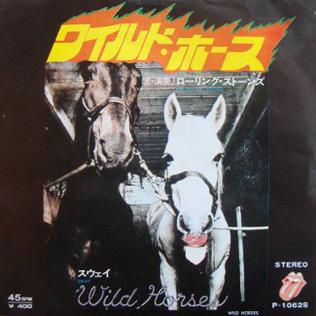
"Wild Horses" is a song written by the British rock band the Rolling Stones with Gram Parsons. It was first released in 1970 by the Flying Burrito Brothers as the Stones didn't think the demo was worth recording fully. It was subsequently recorded by the Stones for their 1971 album Sticky Fingers when they felt it was worth reconsideration. It was also released on 12 June 1971 as a single, with "Sway" as its B-side.
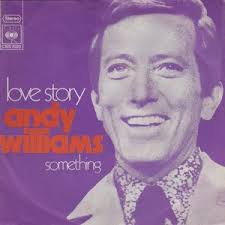
"(Where Do I Begin?) Love Story" is a popular song published in 1970, with music by Francis Lai and lyrics by Carl Sigman. The song was first introduced as an instrumental theme in the 1970 film Love Story after the film's distributor, Paramount Pictures, rejected the first set of lyrics that were written. Andy Williams eventually recorded the new lyrics and took the song to number nine on Billboard magazine's Hot 100 and number one on their Easy Listening chart.
"Ballad of Easy Rider" is a song written by Roger McGuinn, with input from Bob Dylan, for the 1969 film Easy Rider. The song was initially released in August 1969 on the Easy Rider soundtrack album as a Roger McGuinn solo performance. It was later issued in an alternate version as a single by McGuinn's band the Byrds on October 1, 1969. Senior editor for Rolling Stone magazine, David Fricke, has described the song as perfectly capturing the social mood of late 1969 and highlighting "the weary blues and dashed expectations of a decade's worth of social insurrection".

I Don't Want to Do It is a song written by Bob Dylan and performed by George Harrison for the Porky's Revenge! soundtrack, released in 1985. It was issued as a single in the United States and some other countries, but failed to chart.

Viva Las Vegas is an EP by American singer Elvis Presley, containing four songs from the 1964 motion picture, Viva Las Vegas. It was released by RCA Victor in May 1964 to coincide with the film's premiere. The soundtrack EP made the Billboard Hot 100 at No. 92, the lowest-charting release of Presley's career to this point. RCA had not released a Presley EP single in two years; given the format's decreasing popularity in the United States and the disappointing chart performance of Viva Las Vegas, the company would only issue two more for the remainder of Presley's career.














